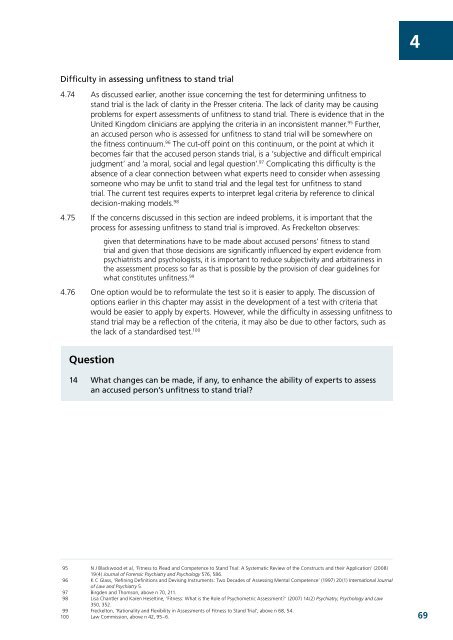Crimes Mental Impairment consultation paper.pdf - Victorian Law ...
Crimes Mental Impairment consultation paper.pdf - Victorian Law ...
Crimes Mental Impairment consultation paper.pdf - Victorian Law ...
You also want an ePaper? Increase the reach of your titles
YUMPU automatically turns print PDFs into web optimized ePapers that Google loves.
4<br />
Difficulty in assessing unfitness to stand trial<br />
4.74 As discussed earlier, another issue concerning the test for determining unfitness to<br />
stand trial is the lack of clarity in the Presser criteria. The lack of clarity may be causing<br />
problems for expert assessments of unfitness to stand trial. There is evidence that in the<br />
United Kingdom clinicians are applying the criteria in an inconsistent manner. 95 Further,<br />
an accused person who is assessed for unfitness to stand trial will be somewhere on<br />
the fitness continuum. 96 The cut-off point on this continuum, or the point at which it<br />
becomes fair that the accused person stands trial, is a ‘subjective and difficult empirical<br />
judgment’ and ‘a moral, social and legal question’. 97 Complicating this difficulty is the<br />
absence of a clear connection between what experts need to consider when assessing<br />
someone who may be unfit to stand trial and the legal test for unfitness to stand<br />
trial. The current test requires experts to interpret legal criteria by reference to clinical<br />
decision-making models. 98<br />
4.75 If the concerns discussed in this section are indeed problems, it is important that the<br />
process for assessing unfitness to stand trial is improved. As Freckelton observes:<br />
given that determinations have to be made about accused persons’ fitness to stand<br />
trial and given that those decisions are significantly influenced by expert evidence from<br />
psychiatrists and psychologists, it is important to reduce subjectivity and arbitrariness in<br />
the assessment process so far as that is possible by the provision of clear guidelines for<br />
what constitutes unfitness. 99<br />
4.76 One option would be to reformulate the test so it is easier to apply. The discussion of<br />
options earlier in this chapter may assist in the development of a test with criteria that<br />
would be easier to apply by experts. However, while the difficulty in assessing unfitness to<br />
stand trial may be a reflection of the criteria, it may also be due to other factors, such as<br />
the lack of a standardised test. 100<br />
Question<br />
14 What changes can be made, if any, to enhance the ability of experts to assess<br />
an accused person’s unfitness to stand trial<br />
95 N J Blackwood et al, ‘Fitness to Plead and Competence to Stand Trial: A Systematic Review of the Constructs and their Application’ (2008)<br />
19(4) Journal of Forensic Psychiatry and Psychology 576, 586.<br />
96 K C Glass, ‘Refining Definitions and Devising Instruments: Two Decades of Assessing <strong>Mental</strong> Competence’ (1997) 20(1) International Journal<br />
of <strong>Law</strong> and Psychiatry 5.<br />
97 Birgden and Thomson, above n 70, 211.<br />
98 Lisa Chantler and Karen Heseltine, ‘Fitness: What is the Role of Psychometric Assessment’ (2007) 14(2) Psychiatry, Psychology and <strong>Law</strong><br />
350, 352.<br />
99 Freckelton, ‘Rationality and Flexibility in Assessments of Fitness to Stand Trial’, above n 68, 54.<br />
100 <strong>Law</strong> Commission, above n 42, 95–6.<br />
69

















